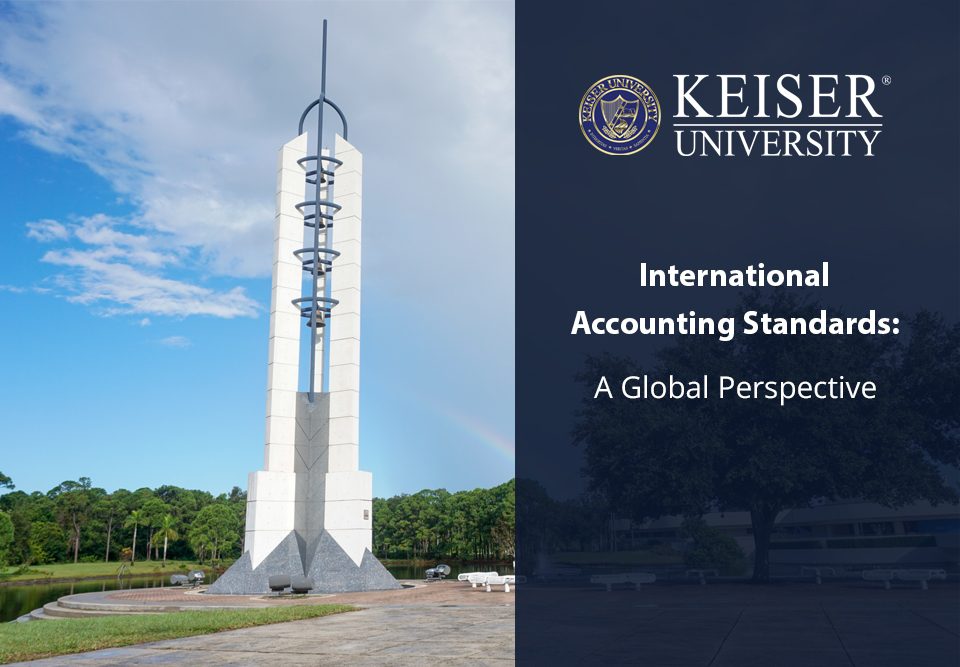Whether you aspire to work in accounting or are already practicing in the field, you’ll need to be familiar with International Accounting Standards (IAS) and how they relate to the global market. With a solid understanding of IAS standards, their benefits and the global impact of these standards, you can practice more confidently while navigating IAS in your own work.
What Are the International Accounting Standards (IAS)?
Specifically, IAS refers to a set of best practices in the accounting field that has been set forth by the International Accounting Standards Board (IASB). The idea behind these standards is to ensure transparency, consistency, and trust in accounting practices across the globe, particularly as it relates to global trade. Technically, IAS was replaced by International Financial Reporting Standards (IFRS) in 2001, but the terms are still often used interchangeably.
History and Evolution of International Accounting Standards (IAS)
IAS standards haven’t always existed in the accounting field. In fact, it was not until June of 1973 that the International Accounting Standards Committee (IASC) was established and tasked with creating a set of standards to represent 10 major countries.
From there, IAS were first drafted where they remained in place until 2001. At that time, the International Accounting Standards Board (IASB) formally replaced the IASC, though the framework of IAS has remained largely the same despite being renamed IFRS. Today, these accounting standards have been fully adopted by over 130 different countries and jurisdictions worldwide.
It is worth noting that the United States does not formally follow IAS or IFRS. Instead, the United States follows another set of standards known as Generally Accepted Accounting Principles (GAAP). Still, because accountants in the United States often work with clients who do business in other countries, it’s important for all accountants to be familiar with IAS standards.
Regulatory Bodies Governing the IAS
The IAS was originally created by the International Accounting Standards Committee in the 1970s. However, the IASC was replaced by the International Accounting Standards Board in 2001. Today, the IASB remains the official governing body of the IAS/IFRS. In 2021, a new International Sustainability Standards Board (ISSB) was also formed to help regulate these accounting standards and ensure compliance across all jurisdictions that have adopted them.
Benefits of Adopting International Accounting Standards
While not all countries have adopted International Accounting Standards, many major countries and jurisdictions have — and for good reason. There are several benefits to having IAS standards in place among accounting and finance professionals, ranging from greater transparency to better access to capital markets.
Comparable and Transparent Financial Reporting
One of the main benefits of following global accounting standards is increased transparency in financial reporting, which helps to enhance the reliability and quality of financial information. When everyone is following the same standards and practices with their accounting, it’s easier for investors and other market participants to stay on the same page and make smart decisions.
Enhancing Investor Confidence
The added transparency and accountability offered by IAS standards can help boost investor confidence, which can result in more informed investment decisions while fully understanding potential risks. All of this ultimately improves capital allocation and can benefit the global economy in many ways.
Access to Global Capital Markets
When accountants have a solid and consistent set of standards to follow when it comes to their reporting and other practices, this also helps improve access to global capital markets. This is particularly true as more countries continue to adopt IAS standards, empowering more nations to work together and optimize their financial performance.
Streamlining Regulatory Compliance for Multinational Corporations
Another major benefit of International Accounting Standards is their ability to help streamline complicated regulatory compliance issues among multinational corporations. When accountants follow the same set of standards and practices, this makes it easier for companies that do business in multiple countries to remain in compliance with all pertinent regulations and compliance laws.
Criticisms of International Accounting Standards
Of course, IAS standards have not been without some notable criticism. There are several reasons as to why the United States (and other major players like China and Japan) have not formally adopted these standards for their own accountants.
Cultural and Jurisdictional Differences
In some areas, different regional reporting requirements and other cultural or jurisdictional differences may simply make adopting IAS too prohibitive. This is most likely to be the case in countries where individual jurisdictions or states are responsible for creating and enforcing their own compliance standards (such as in the United States).
Complexity and Cost Implications
In some cases, the issue with adopting IAS may be more about cost than anything else. Implementing an official set of accounting standards can be expensive, largely if individual businesses are expected to bear the brunt of transitioning to new standards. The process of getting software and reporting transitioned, as well as training employees or updating other systems to meet reporting requirements can add up quickly.
Adequacy and Enforceability of Certain IAS Provisions
In other cases, refusing to adopt IAS standards may simply come down to a matter of enforceability. This is especially true as it relates to specific IAS provisions or requirements that may be too difficult to track or enforce in a particular jurisdiction. Instead, it may make more sense to follow existing standards or the status quo rather than shaking things up with new IAS standards.
Global Impact of International Accounting Standards
Since International Accounting Standards were first created in the 1970s, they have had a major impact on the global market, primarily in countries where these standards have been fully adopted. This remains true not just in areas of investment and governance, but economic development and beyond.
Influence of IAS on Investments, Governance and Economic Development
Thanks to IAS standards, investors can enjoy some added knowledge and peace of mind when it comes to making investment decisions. With more standardized accounting practices, it becomes easier for key players to get the information they need about potential risks and investment opportunities. This results in more capital being invested through the global market.
Meanwhile, following global accounting standards also has the potential to improve economic development by encouraging more business and investment between different nations. This is especially true among nations where IAS accounting standards have already been adopted. Combine all of this with the accurate, consistent, and transparent reporting that IAS provides, and it’s easy to see how these global accounting standards can have a major influence in the way people do business and invest their money on a global scale.
Navigating International Accounting Standards
Accountants, investors and business owners who operate in nations where global accounting standards have been adopted should all understand how to navigate the complexities around IAS. This is particularly as it relates to implementation and compliance. Fortunately, there are some resources/tools available to assist in adopting IAS, in addition to some helpful best practices that can be followed to better implement standards.
Strategies for Successful Implementation and Compliance with IAS
First and foremost, it’s important for accountants and others affected by IAS to identify the standards that will most directly and readily apply to them. From there, it is possible to create a more detailed game plan for which changes will need to be made and on what timeline. Priority should be given to implementing changes that will directly affect your own accounting systems and practices.
Resources and Tools to Assist in Adopting IAS
There are plenty of free and paid tools available to help accountants, investors, business owners, and other professionals adopt IAS more readily while making the transition smoother.
Best Practices for Managing and Implementing IAS
Perhaps the best piece of advice you can keep in mind if you’re facing the need to implement IAS standards is to seek professional guidance. Working with a professional accountant or other expert familiar with the ins and outs of global accounting standards will help you determine your next steps and common mistakes to avoid.
Compliance and Ethical Practice in International Financial Reporting
In following global accounting standards, integrity, ethical practice, and transparency are key to success. This remains true not just for accounting professionals, but investors and business owners alike.
Importance of Integrity and Transparency
At the end of the day, IAS standards rely on integrity and transparency in reporting. Without this level of ethical practice, the entire model falls apart.
Ethical Considerations for Accountants and Financial Professionals
Accountants and financial professionals making the switch to IAS standards must keep some important ethical considerations in mind, most notably when it comes to potential instances of fraud or other illegal actions. Likewise, these professionals must follow appropriate professional conduct while always maintaining a sense of objectivity. These are all things that can be easier said than done yet remain extremely important in holding the highest possible standard for the industry.
Regulatory Mechanisms and Enforcement Measures
Accounting professionals must also understand the regulatory boards and other enforcement measures in place for global accounting standards. This also includes the potential punishment that they could face if they act outside of these standards. More specifically, this means being familiar with the Financial Accounting Standards Board (FASB) and even the Securities and Exchange Commission (SEC). Even though the United States doesn’t follow IAS standards, it does follow GAAP principles, and these are seriously enforced.
Explore a Graduate Program at Keiser University
As you can see, International Accounting Standards play a major role in how accountants practice, maintain data, keep records, and assess finances. Depending on where you work and who your clients are, there’s a good chance you’ll need to follow IAS accounting standards in your own work. That said, making sure you’re informed and up to date on the latest global accounting standards is an important part of your accounting work.
Looking to take your accounting education to the next level? It may be time to explore a graduate program through Keiser University. We’re proud to offer a Master of Accountancy (MAcc) program and a Master of Business Administration in Accounting degree program.
Reach out to request more information from one of our graduate admissions counselors today.






 The instructors at Keiser University impacted my life. They believed in my ability to become a great graphic designer, regardless of how I felt about my skills. KU helped to prepare me for the real world and got me to where I am today.
The instructors at Keiser University impacted my life. They believed in my ability to become a great graphic designer, regardless of how I felt about my skills. KU helped to prepare me for the real world and got me to where I am today.
